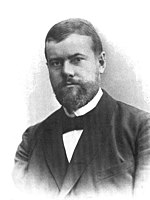Portal:Philosophy/Selected article/16

Maximilian Carl Emil "Max" Weber (German pronunciation: [ˈmaks ˈveːbɐ]; 21 April 1864 – 14 June 1920) was a German philosopher, sociologist and political economist, who profoundly influenced social theory, social research, and the remit of sociology itself. Weber's major works dealt with the rationalization and so-called "disenchantment" which he associated with the rise of capitalism and modernity. Weber was, along with his associate Georg Simmel, a central figure in the establishment of methodological antipositivism; presenting sociology as a non-empirical field which must study social action through resolutely subjective means. He is typically cited, with Émile Durkheim and Karl Marx, as one of the three principal architects of modern social science, and has variously been described as the most important classic thinker in the social sciences.
